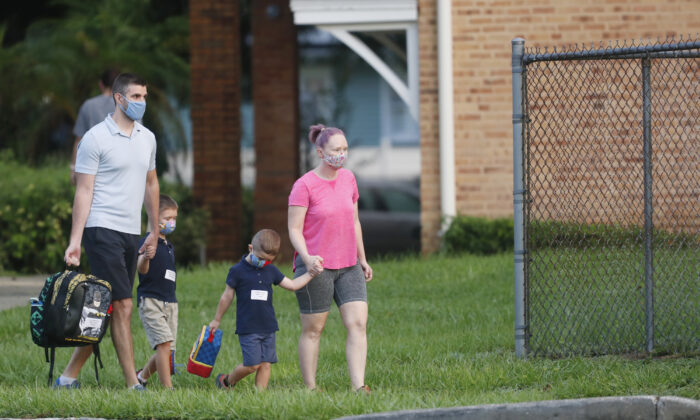Senator Accused of ‘McCarthyism,’ After Chinese Australians Refuse to Condemn CCP When Asked
A new study suggests that it was partisan politics, not science, that dictated whether school districts reopen schools for in-person classes this fall.
Researchers from the the Annenberg Institute at Brown University analyzed the reopening plans of more than 10,000, or around 75 percent, of the nation’s public school districts, trying to find which factors best predict whether a district chooses to bring students back to the classroom or let them learn remotely from home. Contrary to the common belief that school districts are “localized and non-partisan actors,” the researchers said they found evidence that the districts’ reopening decisions are very much shaped by their politics rather than science.
According to the study, the percentage of the vote earned by President Donald Trump in the 2016 general election in school district’s parent county and the district’s size, which translates to teacher union strength, are the two “most consistent and powerful” predictors of a district’s choice in reopening strategy.
When moving from a district where Trump won just 40 percent of the vote to a district where he won a strong 60 percent majority, the likelihood that a school district shuts its physical doors and relies on remote learning dropped by 17 percentage points. Conversely, the same 40 to 60 percent support for Trump led to a nine percent increase in the likelihood of that a school district physically reopens.
Meanwhile, in the “strongest and the most anti-Trump districts,” there is “little movement toward the reopening decision” that is consistent with the public health situation in the area.
When it comes to teachers’ unions, the researchers said they were able to confirm that union power more likely results in school closures and remote learning.
“The smallest districts鈥攚here unions have few members and tend to be less of a power broker in school board politics, have a near 80-percent probability of conducting classes in-person,” the study reads. “The largest school districts鈥攖hose where unions are more likely to have large membership rolls and bigger resources to compete in politics鈥攈ave a roughly 30 percent probability of starting the year off remotely as preferred by the unions.”
The researchers concluded that they found “little evidence” that the reopening plans adopted by the nation’s 13,000 school boards had anything to do with the public health conditions on the ground in their local community.
“We do not find any strong and consistent evidence of a relationship between public health conditions on the ground and school district policy-making,” the study read. “But we do find a clear and substantial connection between politics and district re-opening plans.”
Focus News: School Districts in Anti-Trump Areas More Likely to Keep Schools Shut: Study
China in Focus (Oct. 15): Hunter Biden’s Business Ties With China
